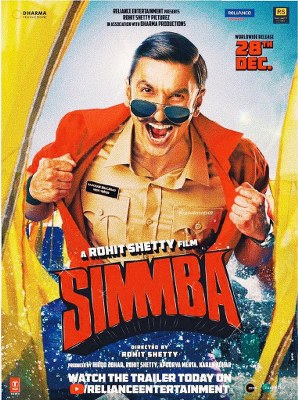The problem with ‘Simmba’ being a hit

“Simmba” is a hit, and there is nothing to rejoice in that victory. This is as basic and crude as cinematic entertainment can get. I laughed, sometimes uproariously, at Ranveer Singh’s over-the-top antics. He is truly the Jim Carrey of Indian cinema. And Rohit Shetty is the desi equivalent of the Farrelly brothers who made crude look cool on celluloid.
Deriving primeval pleasure from the crass values propagated by “Simmba” is akin to enjoying roadside food of the most unhygienic variety. You know it’s going to play havoc with your digestive system. But that won’t stop you from devouring the forbidden food.
Rohit Shetty specialises in the cinema of guilty pleasures. And “Simmba” is no exception. Its efforts to appear socially conscious are laughably self-conscious. An innocent, angelic girl, whom the hero calls “sister”, gets brutally raped and murdered. This is the decadent hero’s cue to jump the queue and leap for anointment. It’s like doing your lobbying for the Padma Shri.
The fact that “Simmba” is a remake of a third-rate Telugu film is a dead giveaway of its true intentions. It beats me why any filmmaker would want to remake Puri Jagannath’s crass and sickening “Temper”, and that too so faithfully. Maybe Rohit Shetty thought he could improve on the original, much in the same way that he perhaps feels he can improve our social environment by making Ranveer Singh lecture us on Nirbhaya and the escalating numbers of rapes in our country.
Much as I enjoyed the crudity of “Simmba” and the high-voltage, no-holds-barred ebullience of Ranveer Singh, I am very disturbed by the warm acceptance that the audience has accorded this brazenly “crass-root level” treatment of prickly socio-cultural diseases like corruption and rape.
Ranveer Singh’s cocky, decadent cop is a strident symbol of all that is wrong with our society. He believes money and brute force are the key to enjoying a privileged status in society, and he may be right!
What is unsettling about the warm acceptance of a film like “Simmba” is that it gives mass acceptance to the concept of instant justice. Since the law takes its time, why not kill the alleged culprit? That’s the logic our hero uses to finish off the rapists in a fake police station encounter. The encounter (which, significantly, was no part of the original Telugu film) is so clumsy and stupid it had me in splits.
My laughter stopped only when I thought of gau bhakts lynching alleged cattle smugglers.
“Simmba” is about mob justice. We are supposed to clap and cheer the unconstitutional murder of rapists because, well, because Simmba says it’s okay. He’s the hero of our times who treats crime as entertainment. When Simmba raids a pub with his colleagues, he breaks into a Govinda-styled jig before doing his job.
It’s wrong to drink on duty. But who says you can’t dance? Or let the rapist be castrated when he says he raped his victim because she hurt his ego.
Rohit Shetty is not going to follow the rules of civil society. When has that worked in real life? Why should it work at the box office? “Simmba” is a film about “Jungle Raj”. And Ranveer Singh is a modern-day Tarzan swinging and singing from branch to branch. Crime Branch, that is.
By Subhash K Jha
(Subhash K. Jha writes on cinema. Views expressed are personal. He can be contacted at jhasubh@gmail.com)






